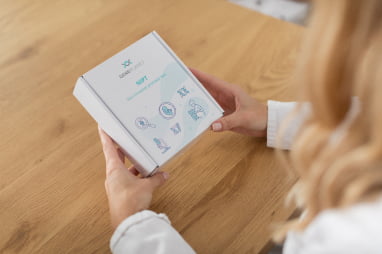How does NIPT by GenePlanet work?
With the latest genetic sequencing technology used in NIPT by GenePlanet testing, we can examine the number of all autosomal (non-sexual) and sexual chromosomes. This allows us to discover the three most common trisomies, Down (T21), Edwards (T18), and Patau (T13) syndrome. At the same time, the NIPT by GenePlanet test also detects many other deletion and duplicate syndromes, where the number of chromosomes is typical, and only a fraction of the chromosome is missing or duplicated. The concept of NIPT testing can be abstract and incomprehensible to many. How is it possible to know if your child has a genetic abnormality before giving birth? How can only 10 ml of pregnant woman's blood find out the fetus' risk of having Down syndrome?
The detection of fetal chromosomal abnormalities
In the late 1960s, science and medicine discovered that by analysing the amniotic fluid, they can determine if the fetus has chromosomal abnormalities (such as Down syndrome). Such diagnostic tests are still used today and are called amniocentesis. Amniocentesis is an invasive procedure in which a gynaecologist inserts a needle into the womb under the control of ultrasound. He then takes a small sample of the amniotic fluid. It constains cells from the fetus' skin, and those contain its genetic material. By analysing that genetic material, we can find out if the fetus has any chromosomal defects.
Amniocentesis poses a certain risk, because, in some (usually rare) cases, it may lead to abortion. That is why scientists have been working hard on other, less invasive methods of detecting chromosomal abnormalities, which carry no risk of miscarriage.
NIPT by GenePlanet test
In 2011, NIPT test was introduced into clinical practice. It is an acronym for non-invasive prenatal test. As amniocentesis, it is also based on analysing fetal genetic material, but this time, isolated from pregnant woman's blood. After seven weeks of pregnancy, future mommy's blood contains her fetus' DNA – also called "placental DNA." This kind of testing is non-invasive and thus safe for both the pregnant woman and the fetus.
It is performed by taking a small blood sample from the pregnant woman. The NIPT by GenePlanet test is more than 99% accurate in detecting the most common trisomies present at birth – Down, Edwards, and Patau syndrome.
NIPT by GenePlanet test can also test for other chromosomal abnormalities, including trisomies of other chromosomes, aneuploidies of sex chromosomes, and 60 microdeletion and duplication syndromes. If you would like, it also reveals the gender of the child.


"Placental DNA" in mom's blood
Pregnant woman's blood contains cell-free DNA; short fragments of genetic material which circulate in the blood. During pregnancy, woman's blood contains cell-free DNA fragments of both her and her fetus. To successfully perform the NIPT by GenePlanet analysis, the share of fetal fragments in the blood (fetal fraction) must be 3.5% or more. From week 10 of pregnancy on, fetal fraction is usually high enough to enable NIPT testing.
Our NIPT by GenePlanet methodology
A 10 ml sample of pregnant woman's blood is analysed in our laboratory in Europe. We sequence millions of fragments of fetal and maternal DNA in each sample using reliable, massively parallel sequencing technology.
NIPT by GenePlanet compares the chromosomes in the tested sample with optimal reference chromosomes and accurately determines the presence of genetic abnormalities. If the aneuploidy is present, a small excess or deficiency is detected when counting a particular chromosome.
Some other NIPT tests use the "targeted sequencing" methods, which analyses only the predetermined chromosomes and their parts. In contract, the NIPT by GenePlanet test methodology provides an overview of the fetus' all chromosomes. This enables extremely accurate results (more than 99% accuracy) regardless of the patient's clinical symptoms. It also allows for a more comprehensive range of testing options; trisomies, aneuploidies of sex chromosomes, and microdeletions and duplications.


NIPT by GenePlanet and COVID-19
During the coronavirus (COVID-19) pandemic, pregnant women are wondering if such tests are safe during pregnancy and what is the chance of getting infected with the new coronavirus. Let us reassure you that regardless of the COVID-19 pandemic, the NIPT by GenePlanet test remains safe for you and your baby. If you follow the preventive measures required by the clinic, the risk of getting infected is minimal.
So there's no reason to hesitate.